Gorgias for Shopify brands: A complete 2026 overview

Kenneth Pangan

Stanley Nicholas
Last edited January 16, 2026
Expert Verified
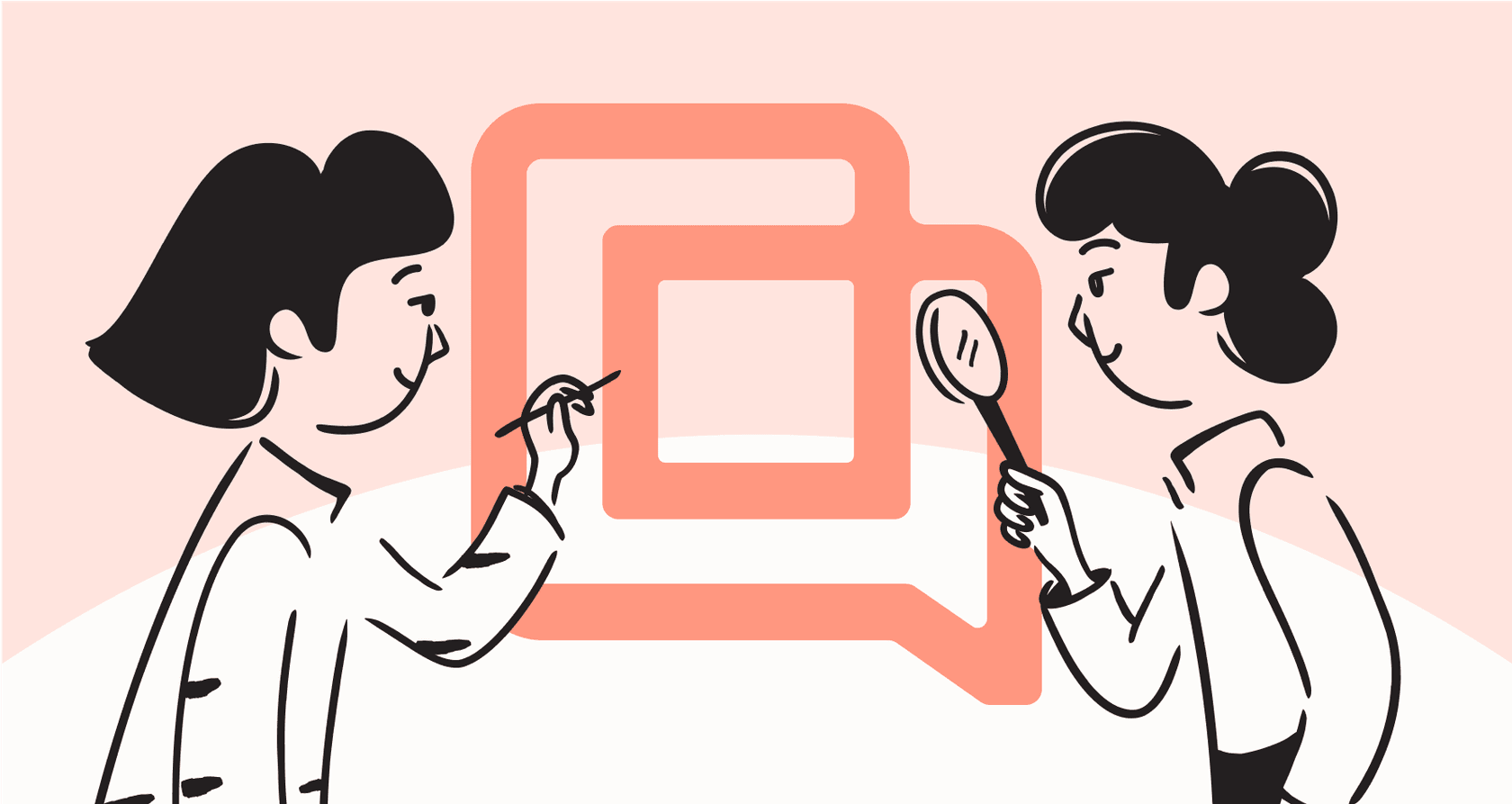
If your Shopify store is taking off, you probably know the feeling. The excitement of more sales is quickly followed by the workload of more customer questions. You're trying to keep up with emails, Instagram DMs, live chat pings, and Facebook comments. Simple questions like "Where's my order?" can start to require dedicated attention, and it is at this point that store owners often look to tools like Gorgias to manage the growth.
It’s a classic sign of success, and it’s usually the point where store owners start looking at professional tools like Gorgias.
Gorgias is widely known as the helpdesk for ecommerce, pulling all those conversations into one place and helping your support team drive more value. It is a mature, reliable platform that powers customer service for thousands of companies.
In this guide, we’ll take a real look at using Gorgias for Shopify brands. We'll get into its main features, what its AI can do, how its pricing works, and key considerations for your setup. By the end, you’ll have a much clearer idea of how it can support your store's growth.
What is Gorgias?
At its core, Gorgias is a customer support platform built specifically for ecommerce businesses. The main idea is to pull all your customer conversations, from email, chat, social media, and SMS, into a single dashboard. This saves your team from jumping between different browser tabs to piece together what a customer needs.
For Shopify store owners, the main draw is its deep integration with the platform. It puts all your customer and order data right beside every support ticket. This means your agents can see a customer's entire order history and even process refunds or returns without ever leaving Gorgias. It’s all about making support faster and more efficient for everyone involved.
Key features of Gorgias
The close connection between Gorgias and Shopify is why so many leading brands choose it. Let's dig into the features that make a real difference in the day-to-day work of customer support.
Deep, native Shopify integration for one-tab support
This is the main event. Instead of your agents constantly switching between Gorgias and the Shopify admin panel, Gorgias puts everything they need in one spot. Right from a customer ticket, your team can:
-
See a customer's full order history.
-
Process a full or partial refund.
-
Cancel or duplicate an order.
-
Create new orders and add discount codes.
This is a significant time-saver. By keeping your team in a single window, they spend less time clicking around and more time actually helping customers. It's how brands like Princess Polly were able to boost their team's efficiency by 40%.

Centralized omnichannel support for a unified view
Gorgias gathers all your customer chats into a single feed. It doesn't matter if they come from email, live chat, SMS, or social media channels like Facebook, Instagram, or even TikTok. This gives you a complete timeline of every conversation a customer has had with your brand, no matter how they reached out.
And if you're running more than one business, Gorgias has a multi-store connection. This feature lets you handle support for several Shopify stores from one Gorgias account, which is a major benefit for agencies or entrepreneurs juggling multiple brands.
Powerful automation with macros and rules
To handle repetitive questions efficiently, Gorgias gives you two primary automation tools: Macros and Rules.
Macros are advanced canned responses. They’re templates that can automatically pull in Shopify data, like a customer's name ("{{Customer First Name}}") or their latest tracking number ("{{Tracking url of last order}}"). With a single click, an agent can send a personalized response with all the right details.
Rules are structured "if this, then that" workflows. For instance, if a customer's email contains the phrase "return policy," you can set up a rule that automatically tags the ticket as "Return" and routes it to the correct person.
These tools are excellent for handling common questions. As your business grows, managing a comprehensive set of rules rewards careful optimization to ensure your team stays focused on complex customer interactions.
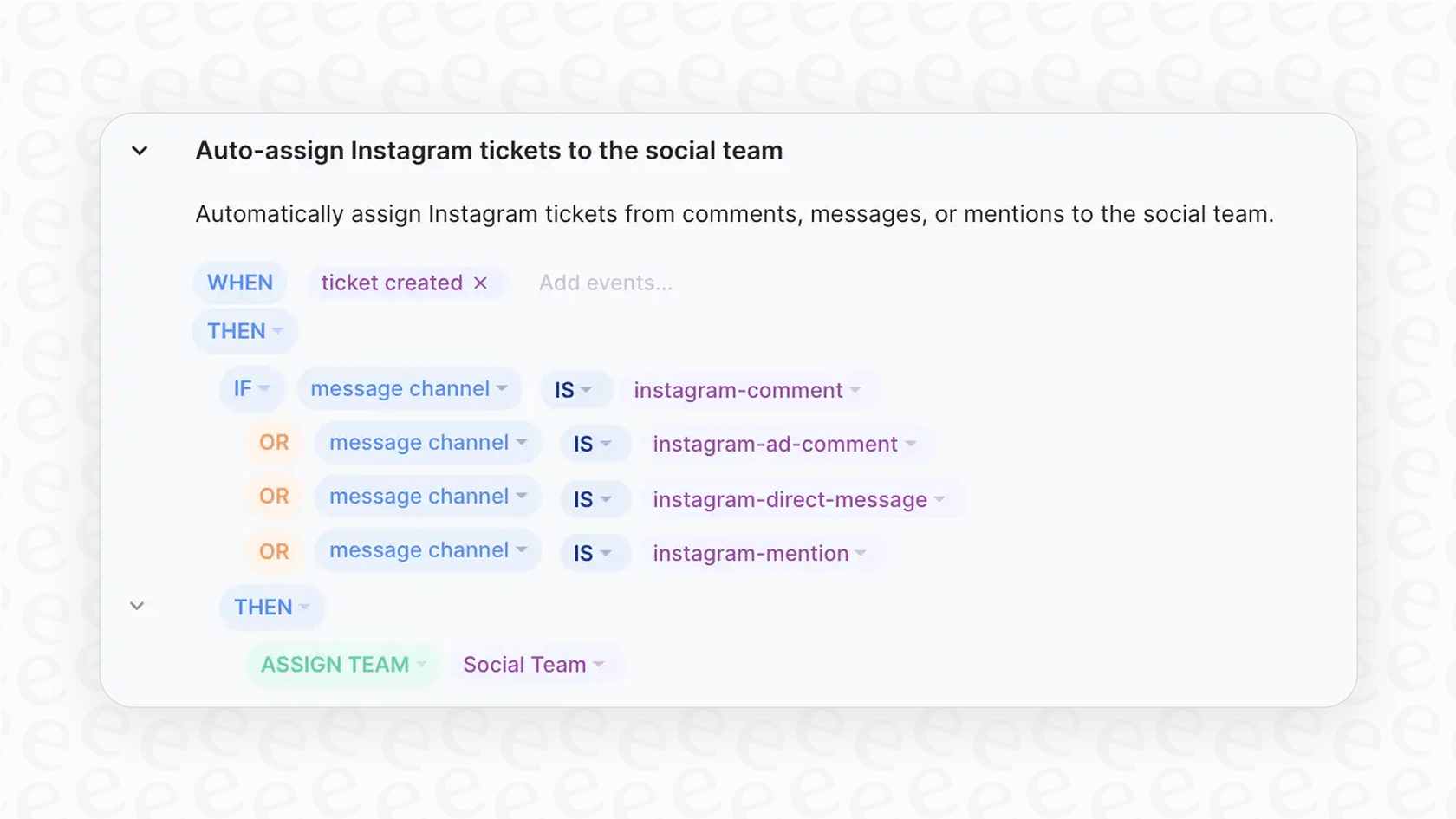
How Gorgias uses AI
Like other industry leaders, Gorgias has invested heavily in AI to push automation even further. Here’s a breakdown of what its AI can do and how you can maximize its potential.
The Gorgias AI Agent: What it can do
The Gorgias AI Agent is built to handle common support requests from start to finish. It is able to:
-
Instantly answer "Where is my order?" questions by grabbing tracking info straight from Shopify.
-
Handle returns, refunds, and order changes based on the policies you've set up.
-
Suggest products to customers during a support chat to help drive more sales.
Gorgias indicates its AI can automate up to 60% of common questions, which allows your human agents to focus on the more complex, high-value conversations.
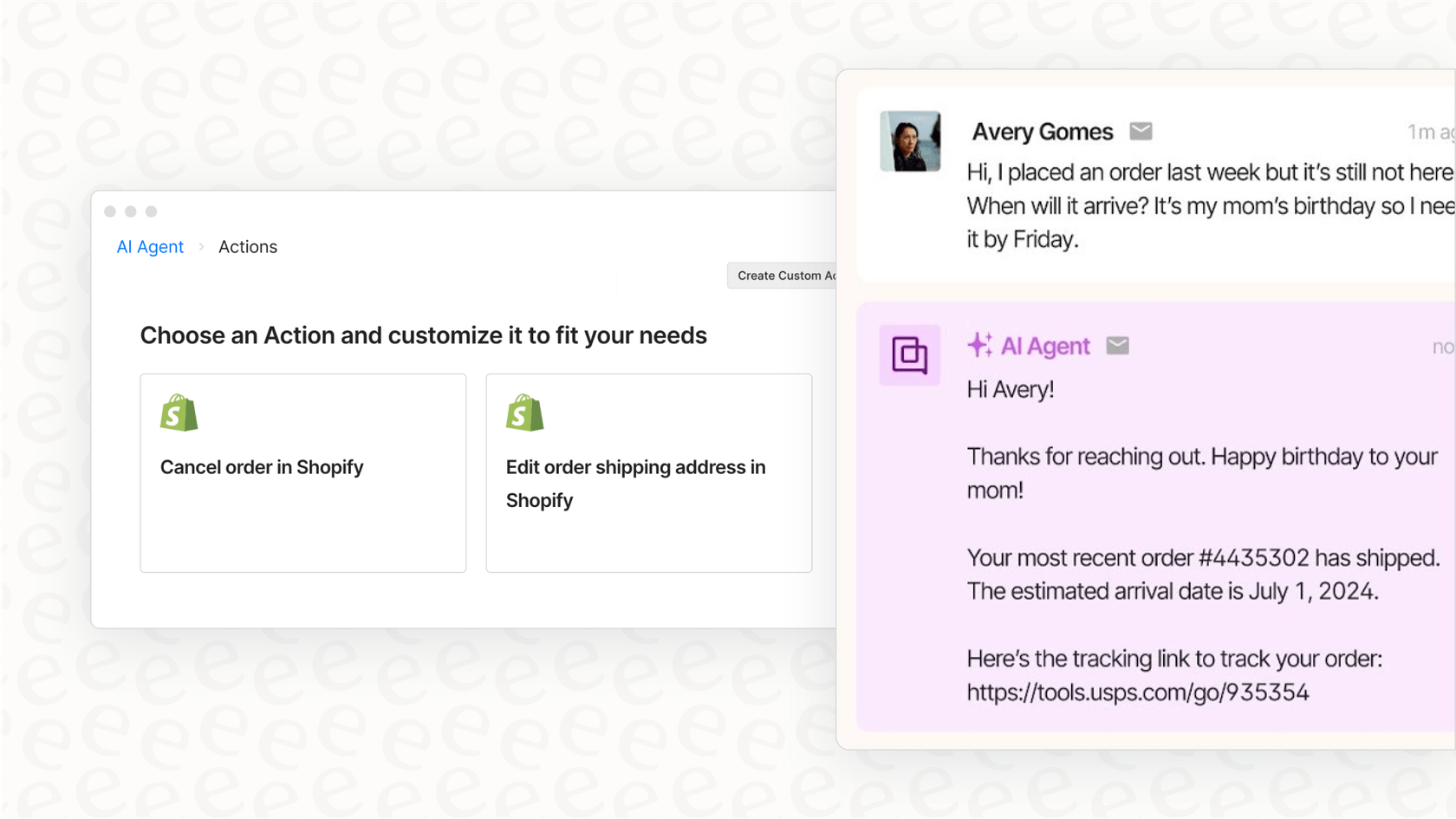
Maximizing your knowledge base within the Gorgias ecosystem
The Gorgias AI is designed to be highly specialized, learning from information within your Gorgias helpdesk, connected apps, and help center. This focus ensures it is perfectly tuned to the data within the platform.
For businesses that have extensive information stored across internal wikis in Confluence, detailed guides in Google Docs, or technical documents in Notion, there is an opportunity to complement Gorgias with additional tools. By integrating a complementary AI layer, you can ensure your AI has access to every piece of documentation, whether it's inside or outside the helpdesk ecosystem.
Gorgias pricing explained
Gorgias offers a structured tiered pricing model designed to match different team sizes. Most plans are built around your monthly volume of "billable tickets."
A billable ticket is any conversation that receives a response, whether it's from a human agent, an automated Rule, or the AI Agent. This model ensures your costs scale directly with your customer engagement, providing a clear link between your support volume and your investment.
Here’s a look at the tiered plans available:
| Plan | Monthly Price (Billed Monthly) | Included Tickets | Overage Cost | AI Agent Cost |
|---|---|---|---|---|
| Starter | $10/mo | 50 | $0.40 / ticket | $1.00 / resolution |
| Basic | $60/mo | 300 | $40 / 100 tickets | $1.00 / resolution |
| Pro | $360/mo | 2,000 | $36 / 100 tickets | $1.00 / resolution |
| Advanced | $900/mo | 5,000 | $36 / 100 tickets | $1.00 / resolution |
| Enterprise | Custom | Custom | Custom | $1.00 / resolution |
Note: Pricing is from the official Gorgias pricing page. You can get a discount by paying annually.
A complementary AI option for your ecosystem
To further enhance your Gorgias setup, you can add a complementary AI layer on top of it. This allows you to bring in specialized features while keeping the power of Gorgias as your central hub.
This is where a tool like eesel AI comes into the picture. It's an AI platform designed to connect directly to the tools you already use, including Gorgias and Zendesk, providing an additional layer of automation.
Here’s how this approach works within your ecosystem:
-
Get started in minutes: eesel AI is designed to be user-friendly and self-serve. You can sign up, connect your helpdesk and other knowledge sources, and see the automation potential immediately.
-
Unify all your knowledge: eesel AI works alongside your helpdesk to connect all your information. It plugs into over 100 sources, including Confluence, Google Docs, and Notion. This gives the AI a broad view of your business, ensuring it can provide accurate answers based on all your documentation.
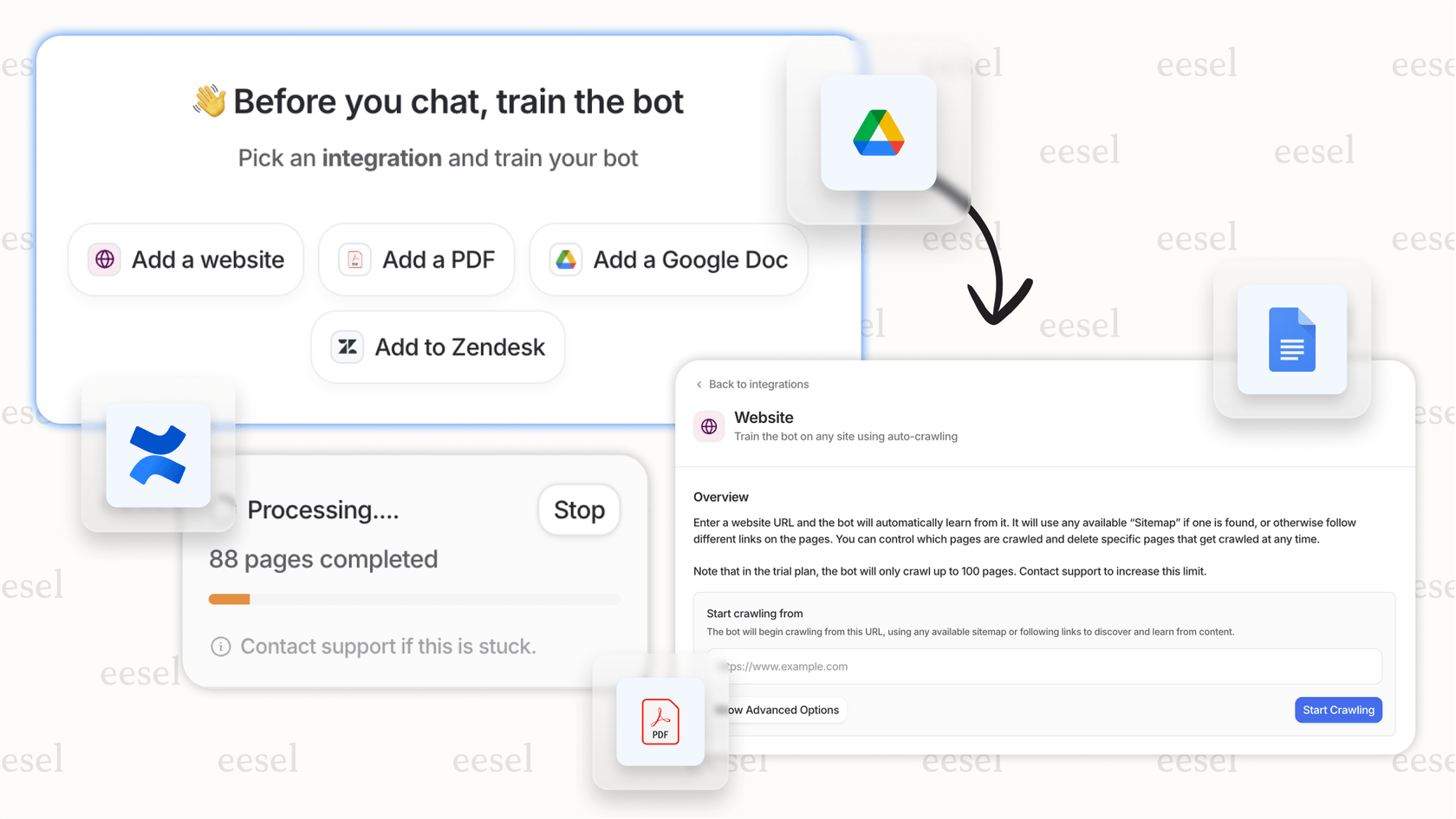
- Test with confidence: eesel AI includes a simulation mode that allows you to test your setup on past tickets. This helps you forecast resolution rates and see how the AI handles queries before it goes live.
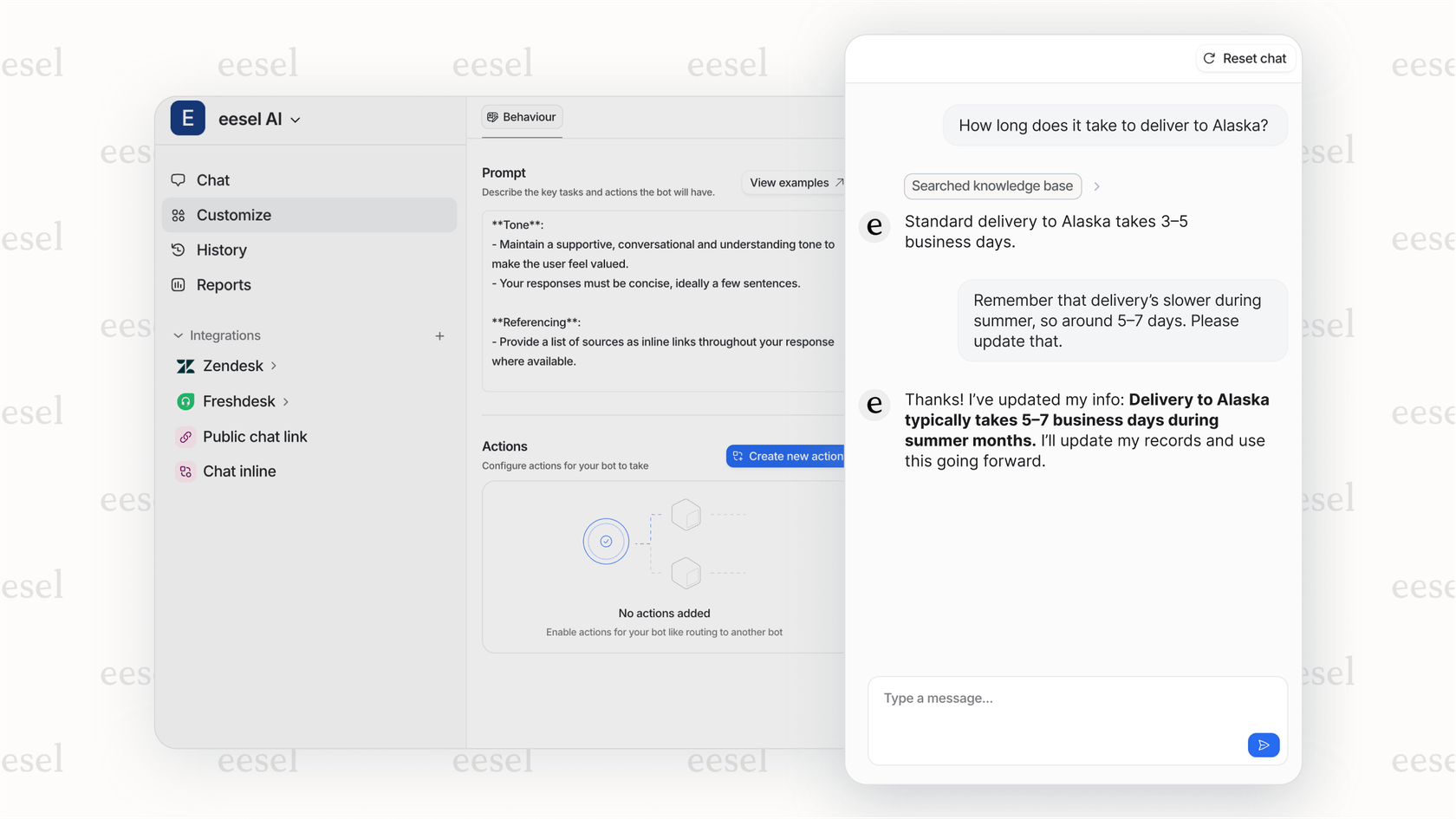
- Predictable pricing: eesel AI's plans offer a flat monthly price based on the features you need, with no per-resolution fees. This provides a clear, predictable cost model that works perfectly alongside your Gorgias plan.
Is Gorgias the right choice for your Shopify store?
Gorgias is a powerful, industry-leading helpdesk for Shopify brands. If you want a deep, native integration and prefer to keep your support system centralized, it is an excellent choice. The ability to manage Shopify orders directly from the helpdesk is a standout feature that significantly boosts team efficiency.
The platform is mature and scalable, offering the reliability that growing brands need. While its pricing and AI are focused on the Gorgias ecosystem, these are strengths for many teams that want a specialized tool.
For brands that want to expand their AI's knowledge base even further, adding a platform like eesel AI provides a great way to enhance your Gorgias setup. It allows you to bring all your company knowledge together while continuing to use Gorgias as your primary support tool.
Take your Shopify support to the next level
If you're already on Gorgias and want to upgrade it with an AI that learns from all your company knowledge, or if you're looking for a complementary AI solution, eesel AI is built to help.
See how eesel AI enhances Gorgias or try it for free and see your automation potential in minutes.
Frequently asked questions
Gorgias is a customer support platform built specifically for ecommerce, consolidating all customer interactions (email, chat, social media, SMS) into one dashboard. Its deep Shopify integration allows agents to manage orders and access customer data directly from tickets, significantly streamlining the support process.
This integration allows agents to view order history, process refunds, cancel orders, and even change shipping addresses directly within a support ticket. This eliminates the need to switch between Gorgias and the Shopify admin panel, saving valuable time and improving overall team efficiency.
The Gorgias AI Agent can automate common requests like "Where is my order?", handle returns/refunds, and suggest products to customers. It specializes in learning from the Gorgias ecosystem, and for teams with extensive external documentation in tools like Google Docs or Confluence, it can be complemented by additional AI layers for full knowledge coverage.
Gorgias charges based on "billable tickets," which are conversations that receive a response from a human, an automated rule, or the AI Agent. This structure ensures that every automated resolution is accurately tracked as part of your support ecosystem, allowing your investment to scale alongside your customer engagement.
While macros and rules are effective for initial automation, they reward careful optimization as a business grows. Maintaining a comprehensive set of rules ensures that support teams can scale their efficiency and focus on delivering high-quality customer interactions.
Gorgias provides centralized omnichannel support, consolidating all customer interactions from email, live chat, SMS, Facebook, Instagram, and even TikTok into a single unified feed. This offers a complete chronological view of all communications a customer has had with the brand, regardless of the channel used.
Platforms like eesel AI offer a complementary AI layer that integrates seamlessly with your existing helpdesk, including Gorgias. It can connect to over 100 external knowledge sources like Confluence and Google Docs, providing a broader knowledge base that enhances your Gorgias setup.
Share this post

Article by
Kenneth Pangan
Writer and marketer for over ten years, Kenneth Pangan splits his time between history, politics, and art with plenty of interruptions from his dogs demanding attention.



